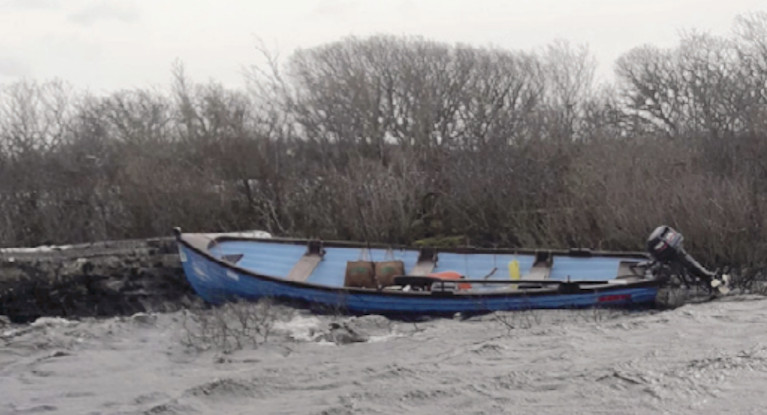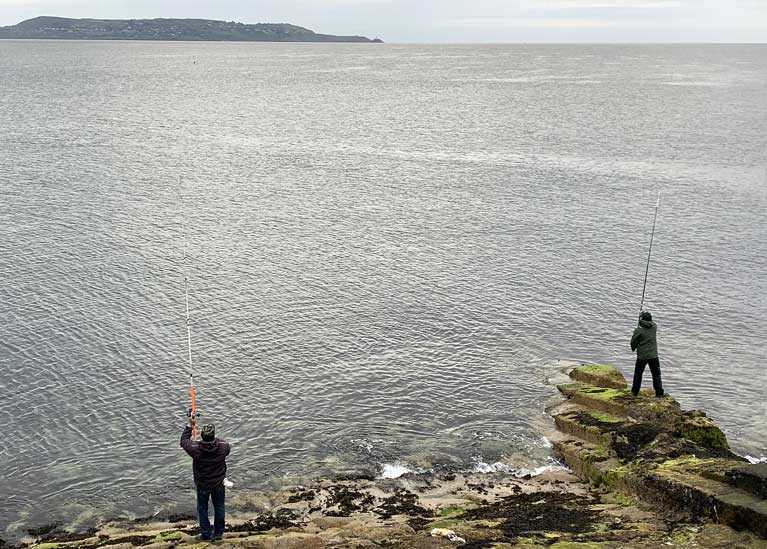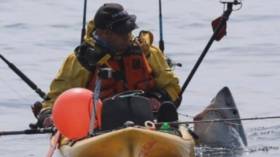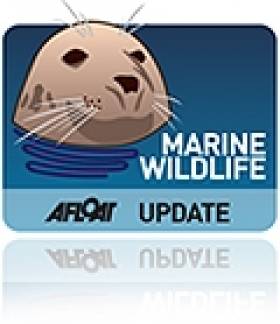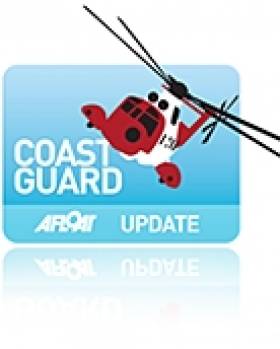Displaying items by tag: Angler
PFD Not Worn by Angler who Drowned in Lough Mask - MCIB Report
An angler who drowned in Lough Mask in Co Mayo over a year ago was not wearing a lifejacket, the Marine Casualty Investigation Board (MCIB) has found.
A report by the MCIB published yesterday (Tues, September 1) has been unable to establish the cause of the incident in which a 78-year old experienced angler drowned in March 2019.
However, it says that the fact that the man’s boat was found in an upright position would suggest that he fell overboard and was unable to get back into the vessel.
The man, who lived locally near Lough Mask, left Cushlough slip near Ballinrobe at approximately 12.30 on March 8th, 2019.
Weather conditions deteriorated during the day from westerly force four to force six, with wind gusts of force seven.
The alarm was raised at 7.23 pm after the man failed to return at 6 pm and his mobile phone was off.
A local person travelled to his house to see if he had returned home and then contacted the gardai at Ballinrobe.
An air and coast search by the Irish Coast Guard Rescue 118 helicopter and Corrib Mask Search and Rescue found nothing, but the vessel was located the following day on the eastern shore of Lough Mask, about 1.5 nautical miles north of Cushlough slip.
The vessel was reported to be in “good order”, according to the MCIB report, with the outboard engine in the lifted position and the port side oar in the shipped position.
The report says the vessel’s starboard side oar was subsequently found in the water nearby, along with the angler’s cap.
A personal flotation device (PFD), fishing gear, supplies and rod were in the stowed position in the vessel.
 A PFD stowed in the forward part of the lake boat under the gunwale Photo: MCIB
A PFD stowed in the forward part of the lake boat under the gunwale Photo: MCIB
The search was hampered by prolonged bad weather periods. The man’s body was located on March 30th near where the vessel had been found. He was not wearing a PFD.
“The casualty was considered locally to be an experienced angler,” the report says, and “had been angling on Lough Mask for many years, and had entered numerous fishing competitions”.
However, it says that “even an experienced angler would have found the conditions challenging”.
An inquest on November 28th, 2019, recorded the cause of death as asphyxia due to drowning.
The MCIB report notes that Lough Mask has “no navigation marks to warn water users of danger”, and “with water levels at the time of the year when the incident occurred, awareness of hazards below the water would be all the more difficult”.
Water temperature at the time of the incident was 8°C, and the report notes that cold water shock is a factor in water temperatures below 15°C.
“This, combined with the casualty not wearing a PFD, would have considerably reduced his chances of survival”, it states.
The MCIB recommends that the Minister for Transport, Tourism and Sport issue a marine notice, reminding mariners of their obligations to comply with the “Code of Practice for the Safe Operation of Recreational Craft”.
It says special emphasis should be placed on the need to be aware of the current forecast for the area; the requirement to wear a PFD, and the need for a boarding ladder, or “other effective means of quickly re-boarding a vessel”.
It says “clubs should be requested to bring this notice to the attention of their members”.
Irish sea anglers are invited to participate in an Inland Fisheries Ireland (IFI) online survey which will help to inform how activities relate to stock levels.
The online survey “seeks to collect information on the behaviours, attitudes and catch preferences of all Irish sea anglers”, the State agency says.
The work which is supported by the European Maritime and Fisheries Fund (EMFF) will be analysed by IFI researchers.
IFI head of research and development Dr Cathal Gallagher said there are approximately 126,000 sea anglers in Ireland and “we hope that they will help us to find out how often people go fishing, what they catch and what they release”.
“Sea angling is an important activity here in Ireland and we want to ensure the future of marine fisheries resource,”he said.
“The data collected will help us to make informed decisions on how to best estimate sea angling catches in Ireland. This catch data will inform management decisions and will prevent the use of worst case scenarios, which can happen when there is a degree of uncertainty surrounding information,”he added.
The survey will take approximately 10-20 minutes to complete, IFI says.
Participants will receive an Angling Ireland neck buff and line clipper for taking part, and tackle vouchers valued up to 200 euro are also on offer in a draw.
The survey is here
Angler Catches Shark in His Kayak off Donegal
After landing the huge fish, Mr Smith released it.
The experienced angler says it was "above and beyond" anything else he has experienced.
Search Ongoing for Missing Angler off Welsh Coast
The search has resumed this morning for an angler who was seen falling from the Tawe Lock gates into the River Tawe last night.
A 999 call was received by the UK Coastguard from a member of the public at 00.18 this morning. Mumbles Coastguard Rescue Team and the Coastguard helicopter from St Athan were sent to the scene and the Mumbles RNLI all weather lifeboat was requested to launch. Police, ambulance and the Fire and Rescue Service also attended the scene.
After an intensive search of the area in the early hours of this morning, the search was suspended. The search was resumed at 8.00 this morning with the Mumbles and Port Talbot Coastguard Rescue Teams, Police search teams and the Mumbles RNLI all weather lifeboat.
Pete Summers who is the Coastguard Area Commander and currently on scene with the coastguard rescue teams says:
“We are very concerned for the safety of this man. The weather last night was challenging with a moderate to rough sea, rain and winds gusting up to gale force. The coastguard rescue teams’ search this morning will be land-based, whilst the lifeboat will be searching the Swansea Bay area.
Dragonfish Discovery in River Suck Highlights Danger of Illegal Aquarium Releases to Native Wildlife
#marinewildlife – The recent discovery by a local angler of the decaying remains of an exotic fish specimen in the River Suck at Correen Ford in the Midlands has raised further concern of the threat to our native wildlife from aquarium releases by otherwise well-meaning individuals. This latest discovery followed by that of a Yellow-bellied Slider turtle on the River Maigue, in Co. Limerick last week.
Despite the partially decomposed state of the fish, Inland Fisheries Ireland (IFI) staff, in consultation with international experts, believe the six inch-long, sharp-toothed specimen to be a Dragonfish (also known as a Violet or Dragon Goby). This fish is native to North and South America and can be purchased in Ireland for private aquariums.
As it is regarded as a warm water species, the Dragonfish is not considered to be able to survive in the wild in Ireland. However, according to Dr Joe Caffrey, Senior Research Officer with IFI, "There are many exotic species of potential concern sold in the aquarium trade in Ireland. These include non-native freshwater fishes, crayfish and aquatic plants. If these are released to the wild they could seriously threaten our native biodiversity and ecosystem function, and the continued conservation of internationally important native species in our rivers and lakes. It is imperative that the public and all stakeholders are aware of the potential damage that exotic animals or plants which are deliberately introduced to the wild can inflict upon our unique wildlife and habitats."
In recent years, human-mediated introductions of non-native species such as Asian Clam, Australian Swamp Stonecrop, South African Pondweed and Zebra Mussel into Irish waterways have resulted in detrimental impacts to native species and habitats, degraded the amenity value of areas that become infested and required costly control measures to be implemented to mitigate these impacts.
Under the European Communities Birds and Natural Habitats Regulations 2011, the unlicensed release to the wild of any animal species, which is not ordinarily resident in Ireland or a regular visitor to the country, in a wild state is an offence.
Any sightings of exotic plants or animals found in or around our waterways can be reported to IFI through the 'IFI Invasive Species' smart phone app which is available to download from the Google Play and iTunes App stores.
The app aids users to report and identify exotic species and take geo-referenced photographs that can immediately be sent to IFI scientists for review. If the sighting is of something new or particularly worrying, this will trigger an immediate on-site survey by IFI staff. IFI want as many people as possible to use this app and help it in its ongoing battle against aquatic invasive species.
Angler Rescued after Fall from Cliff
At just after 1pm Liverpool Coastguard received a 999 call from a member of the public who had witnessed the person fall in to the sea from cliffs adjacent to the historic St. Ninians Chapel. They immediately sent the Coastguard Rescue Team from the Isle of Whithorn, the Royal Navy rescue helicopter from Prestwick and the RNLI Lifeboat from Kirkcudbright.
As the Whithorn Coastguard team arrived on scene, members of the public were just bringing the person ashore. He is believed to have sustained a broken leg and head injuries in the fall. He was winched on board the helicopter and taken to Crosshouse Hospital near Kilmarnock.
Tony Topping Liverpool Coastguard Watch Manager said:
"We're not really sure how the angler ended up falling from a ledge in to the sea but cliff edges are dangerous places and we would ask people to take particular care.
"If you are walking along coastal paths make sure that you are properly equipped. In particular remember to wear sturdy shoes or boots and check the weather forecast before you set out. Do not attempt to climb up or down cliffs unless you are properly equipped and trained to do so. Do not attempt to climb cliffs as a short cut back to the top. Do not attempt self rescue. If you get into difficulty, call 999 and ask for the coastguard.
Angler Rescued from Lough Erne
The man who is on holiday in the area was out angling on Lough Erne in his 2.4 metre open boat, when he got into difficulty and ended up in the water. His boat which was powered by an electric outboard hit ice on the lough and the man who is in his 30's ended up in the water.
He managed to get himself out of the water and made it safely ashore to a small island called Belle Island which is in the upper Lough Erne, County Fermanagh.
Belfast Coastguard called out Erne Coastguard Rescue team, requested the launch of Carrybridge RNLI inshore lifeboat and scrambled the Irish Coastguard rescue helicopter R -118.
The man who was well equipped for angling is suffering the effects of the cold water and sub zero temperatures.
He has been recovered by the Carrybridge lifeboat from a remote and inaccessible part of the island and taken to his accommodation on the Island to warm up.
Steve Carson, Watch Manager, Belfast Coastguard said:
This man was fortunate in this incident.
Unfortunately, with the adverse weather that we are experiencing, people are still taking unnecessary risks. The weather and the forecasted weather has been widely publicised in the media. In past years when this Lough has frozen, we have had calls about people venturing onto the ice, on foot and in vehicles. This is madness, and will end up in disaster if people do not heed the warnings.
Please do not place yourself at risk anytime, but with the extreme weather we are experiencing, that message is highly important.


























